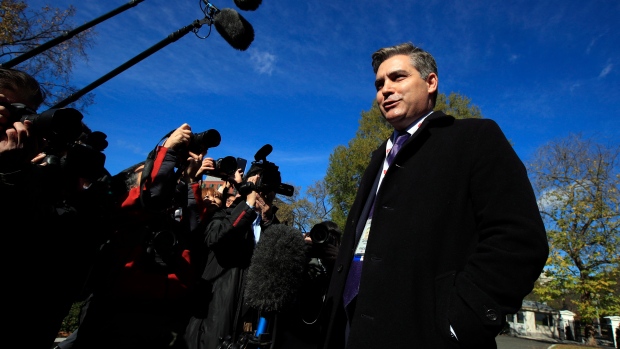Nov 19, 2018
White House still plans to revoke press pass of CNN’s Jim Acosta
, Bloomberg News

The White House notified CNN correspondent Jim Acosta on Friday night that it still planned to revoke his press pass, despite a district court’s ruling earlier that day to temporarily restore the pass pending full review of the case.
- The White House gave Acosta until Sunday afternoon to reply with his own arguments. Acosta’s lawyers wrote back saying it would violate his constitutional rights and fly in the face of Friday’s ruling decision. His lawyers asked the White House to issue a final decision by 3pm on Monday.
- The correspondence was released Monday morning.
Key Takeaways
- The White House move came just hours after Acosta got his press pass back and returned to the press room, and President Donald Trump told reporters in the Oval Office that he would impose new rules on how they behave, telling them that “you have to act with respect. You’re in the White House.”
- Friday’s ruling was limited, focusing on the due process aspect of the White House’s earlier decision to revoke his press pass after a volatile press conference following the midterm elections. The judge said that the decision was “shrouded in mystery” so it wasn’t clear why exactly it had been revoked. Trump has a long history of disagreements with Acosta.
- White House Depute Chief of Communications Bill Shine and Press Secretary Sarah Sanders then sent Acosta a five paragraph letter laying out reasons why the press pass should be revoked, saying he had violated an unwritten code of conduct by refusing to yield the floor to another journalist during that press conference. The letter seemed to be in response to the judge’s criticism of the lack of due process earlier.
- Acosta’s lawyers seized on that, writing: “Nevertheless, despite the admitted absence of such rules, you now seek to punish Mr. Acosta based on a retroactive application of unwritten ‘practices’ among journalists covering the White House. This ex post facto application of vague, unarticulated standards to a journalist’s access to the White House is not only different from your original explanations, but it is the same sort of due process violation that led the district court to issue a temporary restraining order against you on Friday.”






